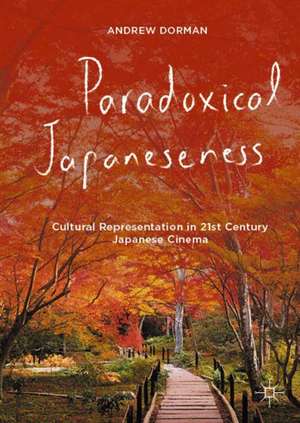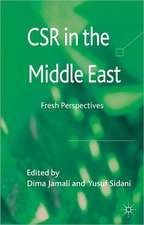Paradoxical Japaneseness: Cultural Representation in 21st Century Japanese Cinema
Autor Andrew Dormanen Limba Engleză Hardback – 23 dec 2016
Preț: 727.31 lei
Preț vechi: 886.97 lei
-18% Nou
Puncte Express: 1091
Preț estimativ în valută:
139.19€ • 144.78$ • 114.91£
139.19€ • 144.78$ • 114.91£
Carte tipărită la comandă
Livrare economică 15-29 aprilie
Preluare comenzi: 021 569.72.76
Specificații
ISBN-13: 9781137551597
ISBN-10: 1137551593
Pagini: 240
Ilustrații: XIII, 224 p. 10 illus.
Dimensiuni: 148 x 210 x 14 mm
Greutate: 0.44 kg
Ediția:1st ed. 2016
Editura: Palgrave Macmillan UK
Colecția Palgrave Macmillan
Locul publicării:London, United Kingdom
ISBN-10: 1137551593
Pagini: 240
Ilustrații: XIII, 224 p. 10 illus.
Dimensiuni: 148 x 210 x 14 mm
Greutate: 0.44 kg
Ediția:1st ed. 2016
Editura: Palgrave Macmillan UK
Colecția Palgrave Macmillan
Locul publicării:London, United Kingdom
Cuprins
Introduction.- Chapter 1: Cultural Specificity and Globalization.- Chapter 2: (Cult)ural Hybridity.- Chapter 3: Concealing Japan in J Horror.- Chapter 4: Utilizing International Film Festivals.- Chapter 5: 21st Century Jidaigeki and Commercial Ownership.- Conclusions
Recenzii
Notă biografică
Andrew Dorman is a freelance writer and English language tutor who received a PhD in Film Studies from the University of St Andrews, UK. He has taught film studies at the universities of St Andrews and Edinburgh, and writes on a range of subjects including Japanese cinema and sexuality in film.
Textul de pe ultima copertă
This book offers insightful analysis of cultural representation in Japanese cinema of the early 21st century. The impact of transnational production practices on films such as Dolls (2002), Sukiyaki Western Django (2007), Tetsuo: The Bullet Man (2009), and 13 Assassins (2010) is considered through textual and empirical analysis. The author discusses contradictory forms of cultural representation – cultural concealment and cultural performance – and their relationship to both changing practices in the Japanese film industry and the global film market. Case studies take into account popular genres such as J Horror and jidaigeki period films, as well as the work of renowned filmmakers Takeshi Kitano, Takashi Miike, Shinya Tsukamoto and Kiyoshi Kurosawa.
Caracteristici
Explores the impact of transnational production practices in Japanese cinema Provides insightful analysis of cultural representation in Japanese films Features a range of textual and empirical analysis














